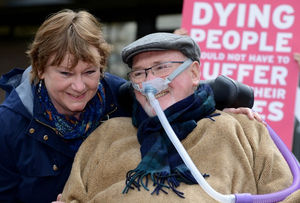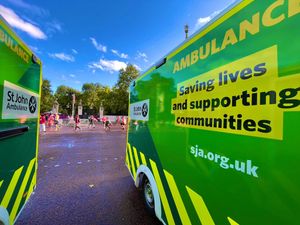Parliament should decide on 'right to die' law, Noel Conway appeal hearing told
Any change in the law on assisted dying should be made by politicians and not judges, the Appeal Court has heard.

Lawyers representing the Secretary of State for Justice David Gauke argued Parliament represents the "conscience of the nation" and is better placed to consider the impact of changing the law in this "sensitive policy area".
Three senior judges are hearing an appeal by motor neurone disease sufferer Noel Conway, from Shrewsbury, who wants the right to enlist help from medical professionals to bring about a "peaceful and dignfied" death.
Outlining the Justice Secretary's case on Wednesday, James Eadie QC said: "The respondent acknowledges at the outset the tragic and distressing circumstances experienced by Mr Conway and his family which evoke the deepest sympathy.
"However, as with other cases where similar issues have been addressed, the respondent's opposition to the appeal is based on an application of the law both procedurally and substantively."
The barrister added: "Any change in the law ought to remain a matter for Parliament."
Mr Conway, 68, wants to be helped to die - which the law currently prevents - when he has less than six months left to live, still has mental capacity to make the decision and has made a "voluntary, clear, settled and informed" decision.
See also:
The retired lecturer has proposed that he could only receive assistance to die if a judge determined that he meets all three of those criteria.
He previously asked the High Court for a declaration that the Suicide Act 1961 is incompatible with Article 8 of the European Convention on Human Rights, which relates to respect for private and family life, and Article 14, which protects from discrimination.
His case was rejected in October last year, but a full appeal against that ruling began on Tuesday.
Mr Conway's lawyers say the law as it stands interferes with his rights and that the court must decide whether that interference is "justified and proportionate".
But Mr Eadie said the High Court was right to find that the safeguards proposed by Mr Conway were "inadequate" in relation to the risks the current law is designed to guard against.
He also said the judges were entitled to consider there were "powerful constitutional reasons" why Parliament's assessment on the necessity for a ban on assisted suicide should be respected by the court.
He added: "In assessing such difficult questions, Parliament inevitably has available a far more extensive range of opinions, coupled with evidence, than the court would be able to receive in practice, along with the intrinsic ability to debate what are essentially sensitive and mixed moral, social and ethical issues for the conscience of the nation."
Mr Conway is too unwell to travel to London for the hearing but watched some proceedings over a video link from Telford County Court on Tuesday.
In a statement ahead of the hearing, he said he is now dependent on a ventilator for up to 23 hours a day and only has movement in his right hand, head and neck.
Mr Conway said his current options are to "effectively suffocate" by choosing to remove his ventilator or to spend thousands of pounds travelling to Switzerland to end his life and have his family risk prosecution.
He is being represented by law firm Irwin Mitchell and supported by the campaign group Dignity In Dying.
Humanists UK, Care Not Killing and Not Dead Yet UK will also be making submissions.
The appeal before Sir Terence Etherton, Sir Brian Leveson and Lady Justice King was expected to conclude today.





